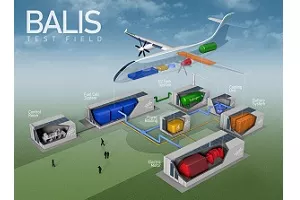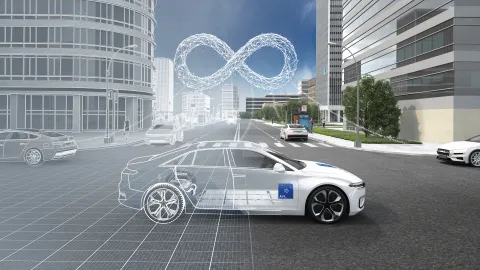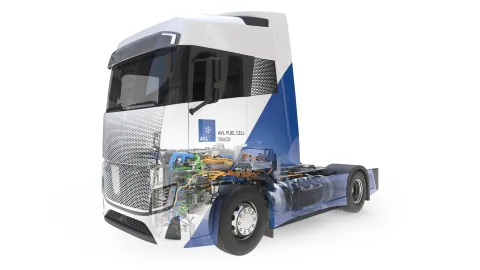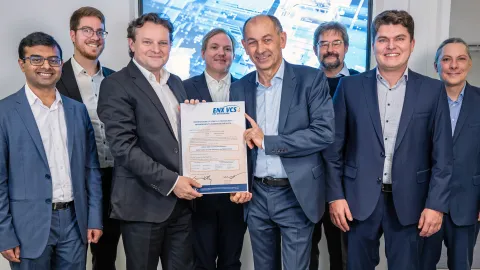AVL Contribution to DLR Project: 1.5- Megawatt Composite Testbed for Fuel Cells

AVL is supporting the German Aerospace Center’s (DLR) BALIS project with a fuel cell composite testbed for up to 1.5 megawatts (MW) of power. The test field forms a development environment for hybrid, hydrogen and electric drive concepts for passenger aircraft with a capacity of up to 60 persons. It comprises the necessary test infrastructure, as well as the main components of the propulsion system itself. These include fuel cell systems, the hydrogen tank, electric motors, a battery system, and the cooling system, as well as control and feedback control systems. The great variability and functional variety of the test environment allows research and development in line with diverse framework conditions, specifications and guidelines. The project is funded by the Federal Ministry for Digital and Transport (BMVI).
Mainz-Kastel, Germany, February 2022: At the Empfingen Innovation Campus in the Northern Black Forest, the DLR is setting up a 2,000 m² test field, the first of its kind in the world, to develop and test fuel cell propulsion systems for aircraft. AVL is supporting the project as a system partner with its container design solutions, which allow a flexible integration of various different technologies (fuel cell systems, H2 tank, e-motors, battery system, cooling system, etc.) in the test environment. Furthermore, the container solutions require an impressively small amount of space, which suits the prevailing spatial conditions. The ground-breaking ceremony for the facility took place on October 6, 2021. The test field is scheduled to commence operation in autumn 2022.
“The BALIS test field is a unique infrastructure, in order to develop fuel cell systems for aviation. This will make it possible to achieve zero-emission flying,” says Professor André Thess, Director of the DLR Institute of Technical Thermodynamics.
“Hydrogen can be used as a fuel in many modes of transport. In the quest for environmentally friendly and sustainable mobility, AVL has assembled a wealth of knowledge and experience – through the challenges faced in developing and testing fuel cell systems for automotive applications. As a partner, we can now incorporate this in the extraordinary project, in order to accelerate the introduction of fuel cells in future aircraft. We at AVL are immensely proud of the involvement in this milestone in the research of zero-emission mobility,” explains Roland Jeutter, Managing Director of AVL Deutschland GmbH.
The world’s first hydrogen-based, 1.5-megawatt propulsion system for aeronautical applications will be realized in the BALIS project as a laboratory demonstrator and test environment for relevant hardware, system integration and control concepts. There is particular focus on the option of flexible integration of the main propulsion system components and validation in the test environment. The ability to map application-oriented load profiles provides ideal prerequisites for testing existing and newly developed hardware, and also allows the identification of technological gaps in the megawatt scale. The extensive test infrastructure also allows the development of propulsion system control technology.
Depending on the application case, an elaborate switch matrix ensures a smooth power connection between the components. Accordingly, relevant load cases, including start and landing procedures, can be simulated and investigated for aircraft. The control intelligence takes on a programmable logic controller, which forms a communication connection with the automation system, which is provided by AVL and adapted to the demands of the project.
AVL’s extensive core areas of expertise provide the best opportunities to master the complexity of integrating the propulsion system for aeronautical applications.
The BALIS project
As part of the National Innovation Programme Hydrogen and Fuel Cell Technology (NIP), the BALIS project receives € 26 million of funding from the Federal Ministry for Digital and Transport (BMVI) and is financed through the Energy and Climate Fund. The funding guideline is coordinated by the National Organization Hydrogen and Fuel Cell Technology (NOW) and implemented by Project Management Jülich (PtJ).
Find out more: www.DLR.de/TT/BALIS
With more than 12,200 employees, AVL is one of the world's leading mobility technology companies for development, simulation, and testing in the automotive industry and in other sectors such as rail, marine, and energy. Based on extensive in-house research activities, AVL delivers concepts, technology solutions, methodologies, and development tools for a greener, safer, and better world of mobility and beyond.
AVL supports international partners and customers in their sustainable and digital transformation. The focus lies on the areas of electrification, software, AI and automation. In addition, AVL supports companies in energy-intensive sectors on their way to a greener and more efficient energy generation and supply.
Innovation is AVL's passion. Together with an international network of experts at more than 90 locations and 45 Tech and Engineering Centers worldwide, AVL is driving the future of mobility. In 2023, the company generated a turnover of 2.05 billion Euros, of which 10 % are invested in R&D activities.
For more information: www.avl.com

AVL is collaborating with major technology leader, Microsoft, to demonstrate the virtualization capabilities for vehicle software development.



Stay up-to-date as a journalist with our latest press releases concerning company updates, research projects, our latest developments, and more.
Download our fact sheet to get a comprehensive overview about what we do as well as our latest company figures.
Get in touch with our Press-Team
For all press and media enquires please email: